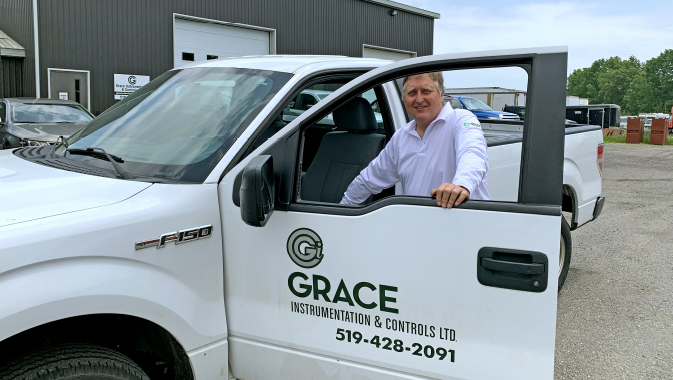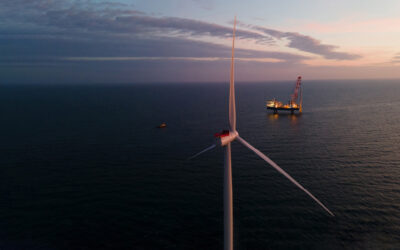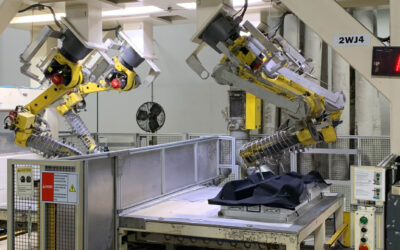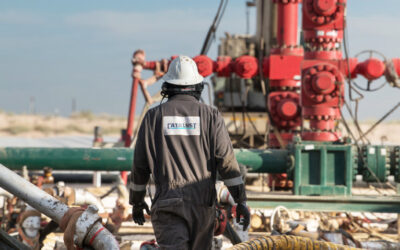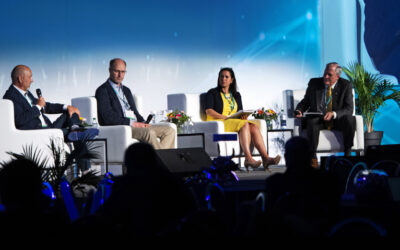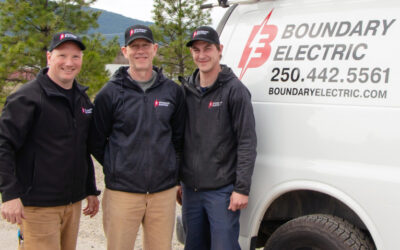Instrumentation is about perfection in all the little details. Grace Instrumentation & Controls Ltd. of Simcoe, Ontario excels at this when servicing high-profile clients – whether in energy or power, oil and gas, water and wastewater, or food and beverage.
Grace Instrumentation expertly handles everything from issues with flow and temperature, stainless steel tubing, field instruments, electrical systems and equipment calibration to quality turnover documentation, all the while maintaining the strict core values of a family-owned and operated business.
The company was founded in 1998 by Terry Grace, an instrumentation technologist and industrial electrician. His daughter Lisa Grace Marr was named vice-president, finance and human resources, in 2015, and her husband Scott Marr was named president, while dad Terry is now executive manager.
“We’re a different construction company,” says Lisa. “My mom and dad ran the business out of the house for the first 15 years. Then I got involved more directly, and my husband Scott, who’s an engineer, started doing some managing of instrumentation projects.”
in 2014, after 20 years of growing the business, Terry was ready to step back, but didn’t want to walk away completely, and both Lisa and Scott were fortuitously at crossroads in their own careers. They decided to make the leap into entrepreneurship, and took over officially on January 1, 2015.
Huge leap
They leapt – and had to hit the ground running. The company was known for its particular knowledge of power generation plants with a past résumé including participation in plants throughout Ontario and Saskatchewan.
Some incredibly large and complex undertakings were in process – like the SaskPower Boundary Dam Carbon Capture Sequestration Project in Estevan, Saskatchewan. “It really changed a lot about how we had to do things,” says Lisa.
The company’s work on the ground-breaking Boundary Dam project included instrumentation panel assembly, installation, calibration and start-up assistance. This was followed in 2017 and 2018 by the installation of a continuous emission-monitoring system at all three of Boundary Dam, Poplar River and Shand power stations. This included the installation of the electrical and instrumentation systems on the stacks of the three stations.
“The Boundary Dam project is the only kind like it in the world,” says Lisa. “They took some of the carbon emissions, captured them and buried them. The big issue for a lot of energy-producing customers is how they deal with their emissions, so this is the only plant in the world to have tried this technique. When they opened in 2015 they had people from all around the world looking.”
Other notable projects for the company include providing instrumentation consulting and calibration services to Covanta, a new energy-from-waste facility for the region of Durham-York in 2017, and working in conjunction with The State Group to install an additional natural-gas compressor-station on the Trans-Canada pipeline. Then in 2017 the company was awarded the instrumentation contract for the new Napanee Generating Station in Ontario – the largest project to date. “The project was just completed earlier this year and marked a major milestone,” says Lisa.
Holding to values
So as the company grew, additional employees came aboard and the management changed, but its core values did not, Lisa stresses. Grace Instrumentation acts with integrity to provide the best people for the job, she says, so customers become repeat customers.
“We have a very different company culture than the others,” she says. “A lot of other family-owned businesses in the industry might be similar to us in that they have a succession between themselves and the former generation, but I think our succession plan went very smoothly. We’re lucky that way.”
Family is important to Grace Instrumentation, so much so that former employees are still considered as such, even years after they move on.
“We still have folks who used to work with us call us and drop in all the time,” says Lisa. “Once you get involved in the company you get sucked in. Our company culture is that we really look to our employees to help us make decisions and figure out where we’re going to go. A lot of people have worked for bigger companies, so they bring a lot of great experience and expertise, and that sets us apart as well.”
Lisa says Scott’s experience as a contract administrator is extremely helpful when it comes to building business relationships based on personal contact.
“He’s really not a believer in email and text,” she says. “He’s very old school that way. Most of our customers have his cell phone and they call him. Even if it’s two in the morning on Saturday, if something major is happening, they know they can call us.”
When competing with large companies it’s important to have something you can do that they can’t do as well, says Lisa.
“We can be nimble and we can be responsive, which is definitely why we get called.”
Building ability on ability
While the company is primarily focused on instrumentation, it also performs an assortment of other technical services as well, such as electrical and mechanical work in power and process piping, third-party oversight, scheduling and project management. Grace excels at all, but the Boundary Dam project was the company’s game changer in terms of management and future plans.
“I think as a company when you get to a certain size of project, and a certain volume of business, you have to have human resources and the infrastructure to support the field work.”
The challenge, she says, is as the company continues to grow, changes must not impede quality service for the clientele or risk employee safety.
“You have to have good employees, excellent health and safety, and a refined quality program. You need a certain level of staff and a certain task flow, and a certain team that can support all of that moving forward. You now have to keep things running. You have to support all of that.”
Going nuclear
An important goal for Grace was getting the company ready to move into the nuclear industry, taking advantage of the growth in Ontario. The company has extensive knowledge of the energy industry and is both ISO 9001:2015 and COR (a health and safety program) certified. This has led to a couple of projects at the OPG Darlington nuclear power plant and has opened the door to other work in the nuclear industry.
“Making that commitment to meet those two standards was a pretty major change in the whole company culture,” Lisa says. “We were no longer just a little trade company; we were now an integrated-systems-management company offering more, and going for more of that high-value work to differentiate ourselves from other companies. We bring what we’ve learned to the market. We can also be competitive.”
What separates the company from the competition is the nature of what it does, she says, as it demands they have a more contextual view of each project. In order to understand where the instrumentation fits in, the whole project has to be in sharp focus.
“We deal with the very smallest element usually towards the end of the project, but if the instrumentation doesn’t work, the plant or the project can come to a halt.”
Always evolving
Grace Instrumentation has become more disciplined at estimating and bidding and looking at a project, says Lisa. A big piece of that is doing project execution plans in the very beginning, examining every aspect, and asking questions about the projects that will not only help inform the company, but also help clients with possible schedule problems or other issues.
“We’re evolving with our thought processes on this, and we’re continuously improving our system as we go. Of all the investments we’ve made, including equipment and building, investing in our management system has been the best investment.”
Despite its success, for a small company like Grace Instrumentation, such rapid progress in such a short time is extremely difficult to manage, Lisa says, and its biggest accomplishment has actually been managing all that growth over the years.
Countrywide recruiting
“Because our trade is very specialized, I had to recruit from across the country to get the number of instrumentation technicians and technologists that we needed for the projects, and I learned a lot about how to do that which was great. Now we have this amazing set of people that we know from B.C. to Newfoundland and everywhere in between.”
Not many go into the trades to begin with, she says, leading to a national trade deficit, so finding good people is hard. “You want apprentices, too. The young, new person and the experienced person; you want both. We were pretty lucky to attract by word of mouth.”
The company also purchased a facility last August in the Simcoe, Ontario Industrial Park, double the square footage of what it had before, with acreage behind and room for expansion. Extra space means possibly getting into more valve repair, valve assembly, and panel assembly in an effort to stand out, says Lisa, a constant concern for a company making its mark and determined to shine against the strongest competition in cities like Toronto.
People are the details, too
“The only thing we can do is make sure our people are treated well. That’s our principle,” she says. If Grace can treat its employees with respect, then they will treat the customers with respect in turn.
“People talk about this and it sounds trite but it’s not,” she continues. “When I look at the people we have hired, whether locally or from across the country, if we treat everybody fairly and if we express to them how much they contribute, it really does add value to your company,” she shares.
“I really can’t stress how important it’s been for us to have the great people we’ve had working for us the last three or four years,” she says. “They have punched above their weight in terms of where they come from – what they’ve known. They’ve taken ownership of what they do, which is so rare and we’re really lucky to have what we have.”
Nevertheless, in this business people come and go, she says. It’s the nature of construction and industrial settings. If they eventually work for somebody else, and they hear the name Grace Instrumentation, they’ll have something good to say. “It’s really kind of a small world. You never know. Your name is all you have at the end of the day.”

